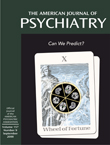Paroxetine and Irritable Bowel Syndrome
Mr. A was 44 years old when he saw his primary care physician for cramping abdominal pain, excessive flatus, frequent diarrhea, and an inability to gain weight (6 feet, 155 lb). These symptoms, present for 30 years, had intensified over 1 year with increased stress. A colonoscopy with a biopsy revealed mild active colitis. Treatment with mesalamine, 800 mg t.i.d., for 9 weeks was not beneficial. Irritable bowel syndrome was diagnosed, and treatment with dicyclomine, 10 mg t.i.d., for 17 weeks was unsuccessful.At a psychiatric evaluation Mr. A complained of gastrointestinal symptoms, low back pain, and recent stress. He met the criteria for major depressive disorder of moderate severity. Psychotherapy was initiated, and paroxetine, 10 mg/day, was given for 2 weeks, increased to 20 mg/day for 3 weeks, then increased to 30 mg/day. After 2 weeks at 20 mg/day the irritable bowel symptoms fully disappeared, and Mr. A’s depression was partially relieved. His depressive symptoms completely disappeared only after 2 weeks at the 30-mg/day dose.After 1 year of treatment with paroxetine, 30 mg/day, and with his irritable bowel syndrome and depressive symptoms in remission, Mr. A’s paroxetine therapy was tapered over 3 months. At 5 mg/day he experienced a relapse of postprandial indigestion and loose stools (two to four per day). One week after he discontinued paroxetine, his typical crampy abdominal pain and diarrhea returned, without a relapse of the depression. These symptoms remitted when Mr. A restarted paroxetine, 30 mg/day. He remained asymptomatic for the next 14 months. Then a second slow taper was attempted. At 10 mg/day the irritable bowel symptoms returned, without depression. Maintenance therapy at 20 mg/day has controlled his irritable bowel syndrome symptoms for the past 6 months, and he has reached his highest weight ever, 167 lb.
References
Information & Authors
Information
Published In
History
Authors
Metrics & Citations
Metrics
Citations
Export Citations
If you have the appropriate software installed, you can download article citation data to the citation manager of your choice. Simply select your manager software from the list below and click Download.
For more information or tips please see 'Downloading to a citation manager' in the Help menu.
View Options
View options
PDF/EPUB
View PDF/EPUBGet Access
Login options
Already a subscriber? Access your subscription through your login credentials or your institution for full access to this article.
Personal login Institutional Login Open Athens loginNot a subscriber?
PsychiatryOnline subscription options offer access to the DSM-5-TR® library, books, journals, CME, and patient resources. This all-in-one virtual library provides psychiatrists and mental health professionals with key resources for diagnosis, treatment, research, and professional development.
Need more help? PsychiatryOnline Customer Service may be reached by emailing [email protected] or by calling 800-368-5777 (in the U.S.) or 703-907-7322 (outside the U.S.).

